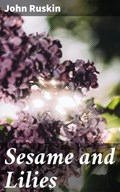In "Sesame and Lilies," John Ruskin offers a profound exploration of social principles, gender roles, and the transformative power of education. Divided into two essays'Äî"Sesame" concerns the critical importance of the cultivation of the mind, while "Lilies" discusses the moral and intellectual education of women'Äîthis work eloquently illustrates Ruskin's belief that society's progress is rooted in the moral and intellectual growth of its members. Written in a compelling yet accessible literary style, the text employs vivid imagery and intricate metaphor, reflecting the Victorian values and tensions inherent in Ruskin'Äôs era, particularly regarding the changing roles of men and women in society. John Ruskin (1819-1900) was a prominent art critic, social thinker, and advocate for the Pre-Raphaelite movement, whose works often scrutinized the implications of industrialization on art and society. His multi-faceted background in art, philosophy, and economics deeply influenced the themes of "Sesame and Lilies." His commitment to improving society through reformative education and empowerment of women is evident, as he believed that knowledge was key to moral and social betterment. "Sesame and Lilies" is highly recommended for readers interested in gender studies, Victorian literature, or social philosophy. Ruskin'Äôs eloquent prose and insightful analyses invite reflection and discussion, making this work not only a timeless classic but also a critical piece for understanding contemporary debates around education and gender roles. Engage with this seminal text to appreciate the depth of Ruskin's vision and its relevance in today's discourse.

